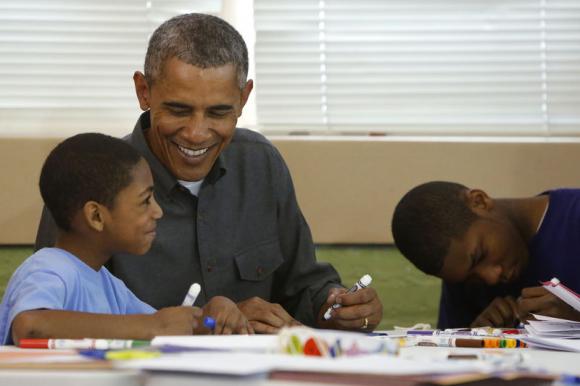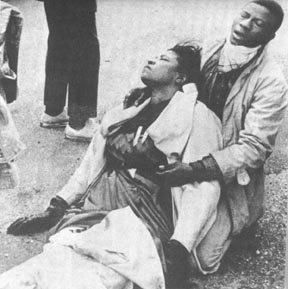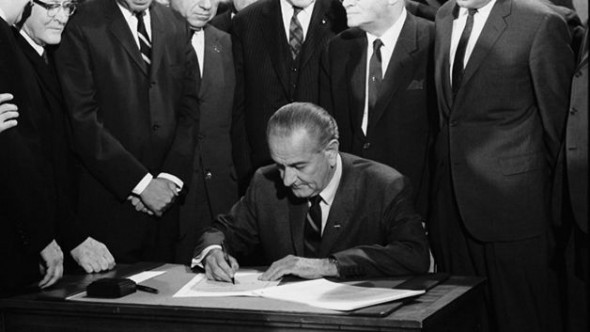By Tabu Butagira,
Reviewed by Lila Ojha
President Obama, NPR interview

As the first African-American President of the US, Barack Obama is the highest political beneficiary of the suffrage fought for by Selma demonstrators. His handling of race relations today is being examined in the context of Martin Luther King Jr.-led Civil Rights movements 49 years ago. Photo Credit: Reuters.
The Selma movie released in November 2014 is co-produced by Oprah Winfrey’s Harpo Productions and Cloud Eight Films. It depicts police brutalization, on Alabama Governor George Wallace’s orders, of civil rights activists during the 1965 Selma-Montgomery march.
Wallace is cast as a “segregationist” democratic governor, although some reviewers suggest his characterization in the movie may have been exaggerated. The coverage in national papers of ferocious, inhumane and degrading bludgeoning of the blacks horrified television viewers and newspaper readers, galvanizing American people across races and states to participate in the Martin Luther King Jr.-led peaceful demonstrations.
Governor Wallace was a populist and four-time losing presidential candidate. Not only did he actively encourage discrimination against blacks but (according to the movie) sadistically deployed the state’s coercive forces to repress, shoot and ill-treat unarmed, peaceful demonstrators seeking, among other things, the right to vote and be treated equally as all American citizens.

Amelia Robinson, together with her suffocated rescuer, pass out after a violent police attack at Edmund Pettus Bridge in Selma in 1965. Photo Credit: SchillerInstitute.org
Unlike Malcolm X, inclined both in real life and the movie to violence and only gravitating to peaceful means temporarily, King Jr. pitched exclusively for non-violent means to overcome the segregation.
The demonstrations King and others led resulted in President Lyndon Johnson signing the Civil Rights and Voting Rights Acts, which for the first time handed blacks the right to vote and be voted.

The signature that authorized Black Americans to vote and be voted for elective offices. Photo Credit: www.bet.com
This breakthrough laid the foundation for the election on November 8, 2008 of Barack Obama as the first African-American President of the United States.
In acknowledgement, the Reuters news agency reports that Obama will next month visit Selma, Alabama, to “recognize the 50th anniversary of [the] historic marches …against segregation”.
Last year, racially tinged riots enveloped Ferguson — spreading later to other American cities — after a white police officer Darren Wilson shot dead an unarmed African-American teenager, Michael Brown. It was an outburst of cumulative anger by protestors who feel marginalized by law and disadvantaged economically in their own country.
One strand of the argument, therefore, is that African-Americans still strive for equal treatment in law and fact, better opportunities and social justice. Many however are thriving whether in sports, entertainment or other professions/occupations.
The vandalism by Ferguson protestors however sharply contrasts with Selma’s non-belligerent marches and defile the sanctity of King Jr.’s doctrine of non-violence; to remove darkness with light, defeat hate with love.
The riveting and newly-released dramatic film depicts the 1960s Civil Rights demonstrations in Selma, Alabama. Source: Washington Post
A decision by Missouri Governor Jay Nixon, a democrat rumored to harbor presidential ambitions; to deploy the National Guards and the accompanying military-grade response by police resurrected Wallace-era voter-targeted political populism and executive excesses. It peels the layer off the ulterior motivations of some leaders and their patronage calculations in every action and inaction.
However, a more equal observance of civil rights has evolved in the US with irreversible, even surprising, gains.
Ferguson flamed when the current US President Obama, Attorney General Eric Holder and Homeland Security Secretary Jeh Johnson — under whose purview fall justice administration and enforcement of civil rights — are all African-Americans. They would, without the constitutional reforms instituted by President Lyndon following the Selma events, be legally deprived of suffrage.
The latest widespread reports of arguably racist encounters (mostly between police and African-Americans), President Obama argues, have more to do with technology that enables instant sharing of information on multiple media platforms rather than a spike in these incidents.
Both the actors in Ferguson, just like King Jr. and Governor Wallace, pandered to the public gallery. For instance, King Jr. aborted at Edmund Pettus Bridge a demonstration that had attracted thousands of all races, once police withdrew and allowed them uninhibited pass. Why? Because King Jr. discerned that a lack of confrontation meant their story would not dominate news headlines. This means he aimed to cultivate publicity capital to popularize the agenda of his activism. 49 years on, in Ferguson, demonstrators huddled, chanted and gestured vivaciously at most whenever journalists focused their cameras on them.

A provocative post, Tabu. I am intrigued by your thesis that the violent turn Ferguson’s protests took may have undermined the larger goals of the movement. Could it be this is because there isn’t a single figure to speak on the issues in the manner of Dr. King with Selma?
This made me think, Tabu, I enjoyed it– it’s provocative with big claims that you support well. You seem to layer several angles, keeping me on my toes while I was reading and watching them all braid together into one final conclusion. Interesting to compare Capitol Hill’s decision to send the National Guard with Wallace-area brutality, meanwhile pinpointing how many of our current leaders are black, and wouldn’t even hold their positions now if Wallace would have gotten his way then. Provocative… I like it. Well done!